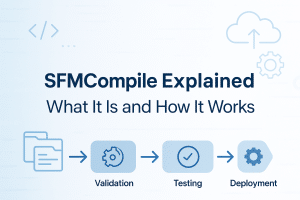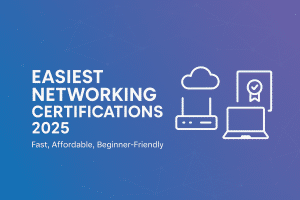Epic certification is a credential that helps healthcare IT professionals show their expertise in Epic software systems. Epic is one of the leading electronic health record EHR platforms, used by hospitals and healthcare facilities. Getting certified proves that you can confidently manage patient records, support healthcare operations, and use Epic tools to improve patient care.
Epic-certified professionals are in high demand. They help healthcare providers and healthcare organizations run more smoothly by using Epic’s features in clinical, technical, and administrative areas.
Understanding the Epic certification path is a smart first step if you plan a long-term healthcare information technology career.
Epic Certification Exam Outline
The Epic certification exam assesses your proficiency in using Epic to manage patient records and healthcare operations. While the exact content may vary depending on the module, a general outline includes:
- System Configuration: Understanding how to set up and customize Epic applications to align with organizational workflows.
- Workflow Optimization: Demonstrating the ability to streamline processes within the Epic system for improved efficiency.
- Reporting and Analytics: Creating and interpreting reports to support data-driven decisions.
- Security and Compliance: Ensuring the system adheres to privacy laws and organizational policies.
The exam typically includes multiple-choice questions, practical scenarios, and project-based assessments.
Epic Certification Exam Details
Epic certification is administered exclusively by Epic Systems Corporation, based in Verona, Wisconsin. The certification process is tightly controlled and is usually only available to individuals who are employed by a healthcare organization that has a current contract with Epic. Independent certifications are generally not available to the public.
To achieve Epic certification, candidates must:
- Complete Training: Attend official Epic training sessions, which may be in-person or virtual, depending on the module.
- Pass the Exam: Successfully complete the certification exam, which tests both theoretical knowledge and practical application.
- Maintain Epic Certification: Stay updated with the latest Epic system changes and complete any required continuing education.
Exam Format
- Provider: Epic Systems Corporation
- Mode: Typically in-person at Epic’s campus in Verona, or via a secure online testing environment
- Type of Questions:
- Multiple-choice questions
- True/False
- Scenario-based questions
- Hands-on simulations or project submissions (for certain modules)
- Passing Score: Generally around 80% (may vary by module)
- Attempts Allowed: Typically, one retake is allowed if you do not pass on your first attempt
Time & Duration
The certification process includes:
- Training: Usually 2 to 6 weeks, depending on the complexity of the module
- Study/Practice: Candidates are expected to complete exercises, case studies, and quizzes between training sessions
- Exam: Taken after the training period, can last 1 to 3 hours, depending on the module.
Find out the full breakdown of EPIC certification costs and what you need to budget for in 2025.
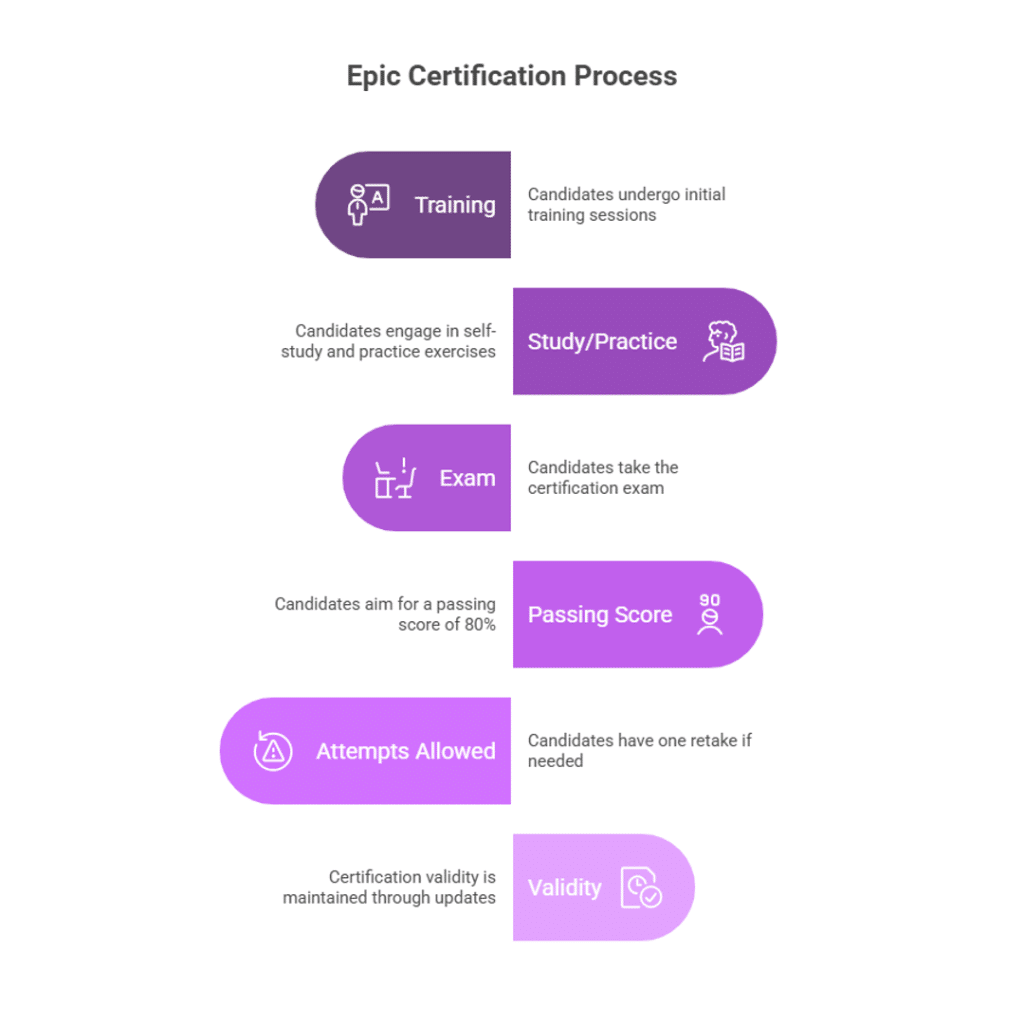
5 Amazing Benefits of Epic Certification for Healthcare Providers
Becoming Epic certified has many career and workplace benefits, especially in the healthcare industry. Some of the most important advantages include:
Better patient care
Epic tools help doctors and nurses access complete, up-to-date patient records, improving diagnosis and treatment.
Efficient operations
Epic software streamlines administrative tasks like scheduling, billing, and record-keeping.
Career Advancement
Epic certification can open doors to promotions, leadership roles, and higher salaries. If you’re also considering advancing your financial and business acumen, the FMVA certification is another great credential to boost your career in finance and analytics.
Professional development
You stay current with industry tools and improve your technical and analytical skills.
Competitive edge
With Epic skills on your resume, you stand out in the job market.
Epic-certified employees are trusted to handle critical healthcare technology tasks, which is why healthcare providers are always looking for skilled professionals with this certification. Similarly, if you’re eyeing high-paying roles in the cybersecurity industry, exploring the top-paying cybersecurity jobs can offer you an excellent career roadmap.
Epic Certification Requirements: Cost
One of the most common questions is: How much does Epic certification cost?
The Epic certification cost depends on the type of certification and the training programs involved. The cost generally ranges between $500 to $10,000. While this may seem expensive, many healthcare organizations or employers are willing to sponsor your certification, especially if you are already working in a healthcare setting or are an Epic customer.
Here’s a breakdown of what may affect your total cost:
- Module type (e.g., Ambulatory, Inpatient, Hospital Billing)
- In-person vs. virtual training
- Study materials and practice exams
- Number of attempts at the certification exam
It’s important to understand the Epic certification cost in advance and check with your employer about reimbursement or sponsorship opportunities. If you’re also looking to expand your skills in cloud computing, checking out the best cloud computing certifications can help you further strengthen your IT career.
Explore the full Epic certification cost breakdown.
Key Roles Requiring Epic Certification
Epic certification opens doors to various specialized roles within healthcare IT. Here are some key positions:
- Epic Analyst: Tailors Epic software to meet organizational needs, ensuring optimal functionality.
- Epic Application Coordinator: Oversees the implementation and maintenance of specific Epic modules, acting as a liaison between end-users and the technical team.
- Epic Project Manager: Leads Epic software implementation projects, coordinating between departments to ensure timely and efficient deployment
- Epic Trainer: Educates staff on using Epic systems effectively, developing training materials and conducting sessions.
- Epic Report Writer: Creates customized reports from Epic’s data, aiding in decision-making and operational efficiency.
These roles are integral to the successful adoption and utilization of Epic systems in healthcare settings.
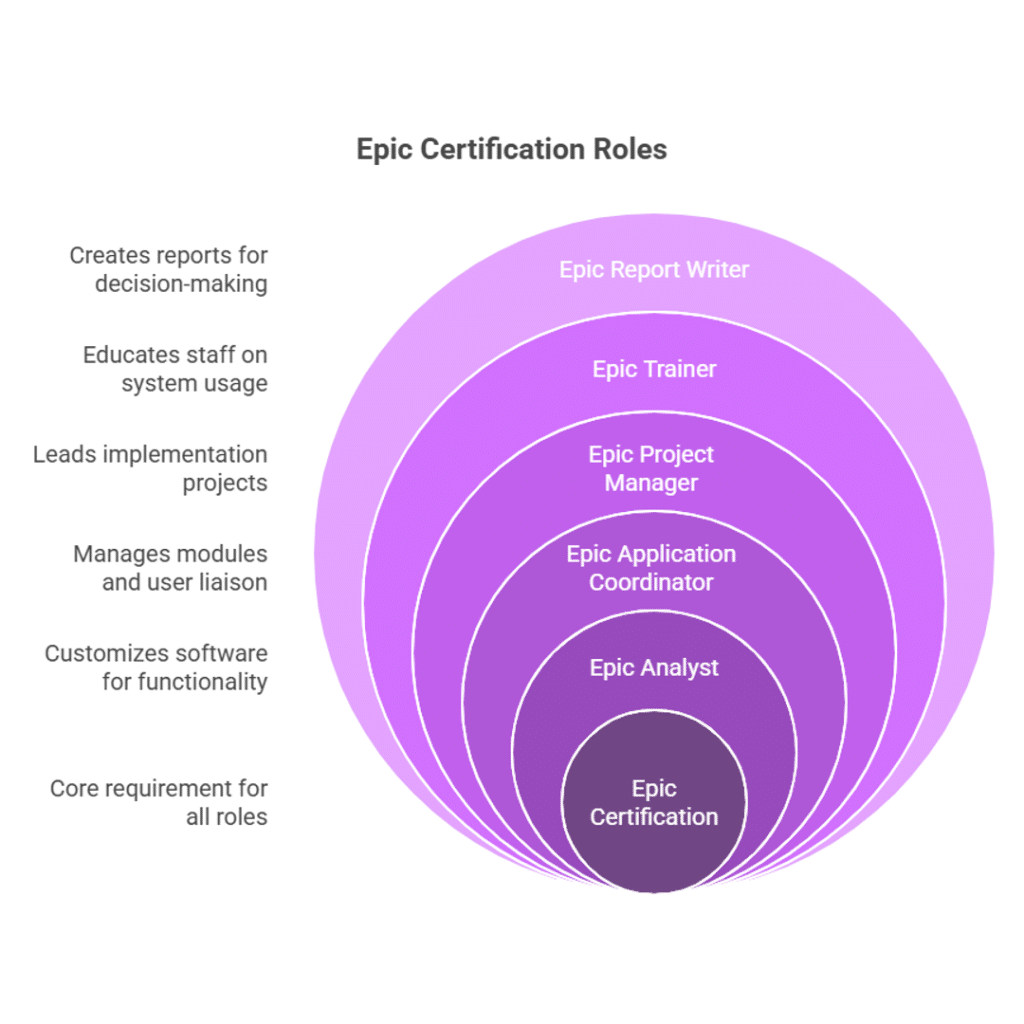
Preparing for the Epic Certification Exam
The Epic certification exam is a big part of becoming certified. It’s designed to test your understanding of Epic tools, workflows, and system capabilities. Here are key tips to prepare:
- Hands-on practice: If you’re already working in a hospital or clinic that uses Epic, spend time using the system regularly.
- Review training materials: Epic provides official training materials for each module, which you should study thoroughly.
- Attend training sessions: You will likely attend in-person training or access virtual labs depending on your certification path.
- Take practice exams: These help you get familiar with the exam format and identify areas where you need improvement.
- Stay consistent: Prepare over several weeks, ideally six to eight weeks before the exam.
Being well-prepared for the certification test gives you a higher chance of passing and earning the title of Epic certified professional on your first attempt.
Choosing the Right Epic Certification Path
Epic offers many types of certifications based on your role and interests. Choosing the right Epic certification path, including specialized certifications, is essential to ensure it aligns with your career goals.
Some of the most popular Epic certifications include:
- Ambulatory (outpatient clinics)
- Inpatient Clinical Documentation
- Hospital Billing
- Epic Willow (pharmacy)
- Epic Beaker (lab)
- Epic Cadence (scheduling)
- Epic project management certification
You can also pursue Epic analyst certifications, Epic application coordinator roles, or even become an Epic trainer. For those focusing on networking as a career, exploring the best networking certifications could also be a game-changer in terms of long-term career development.. Each path supports different types of healthcare operations, so take time to explore what best suits your interests.
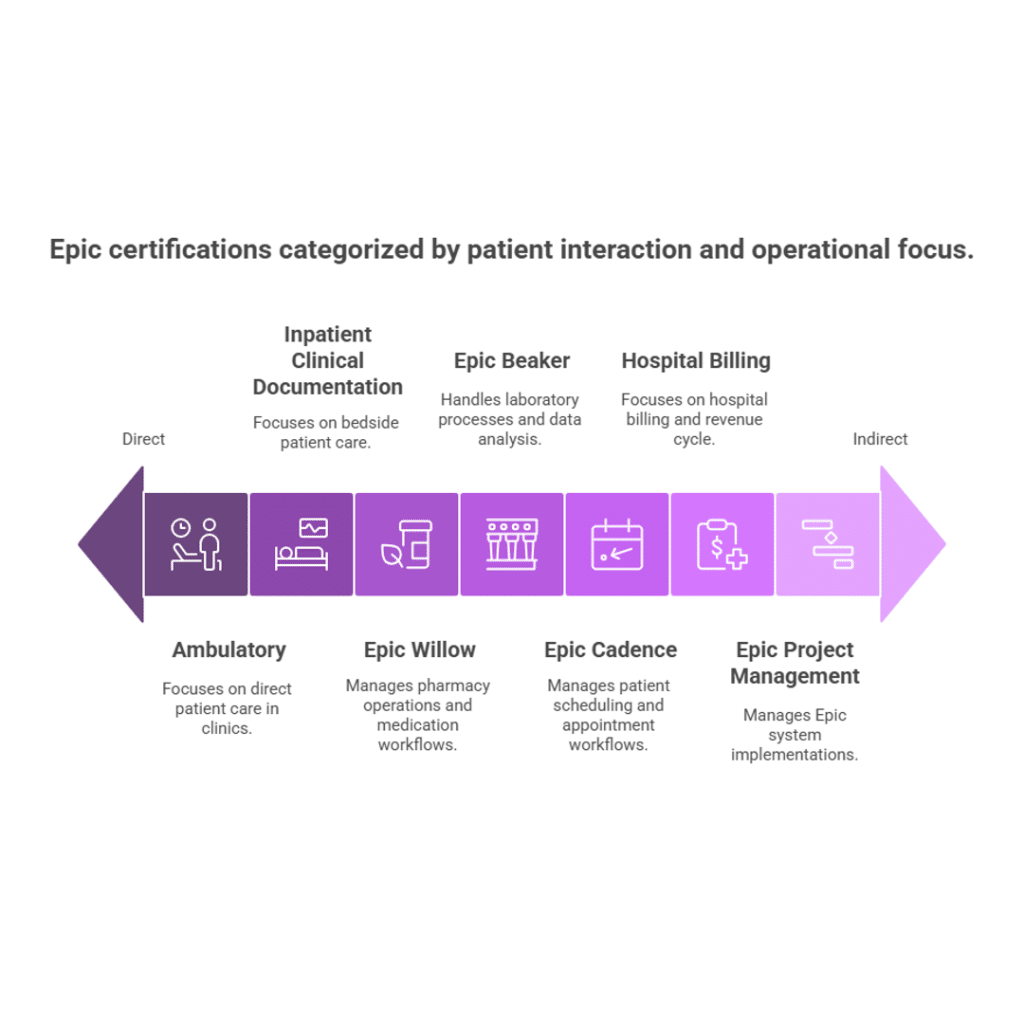
Epic Certification Training and Education
Your journey to becoming Epic certified begins with Epic certification training through various epic training programs. This is where you learn how to use Epic’s tools, workflows, and modules based on your chosen path.
The Epic certification training program typically includes:
- In-person training at Epic Systems’ headquarters or regional training centers
- Virtual labs that simulate real-life tasks
- Structured training programs with hands-on exercises
- Access to training materials and guides
Whether you’re focusing on clinical workflows or back-end configuration, Epic certification training helps you understand how to use Epic in real-world scenarios.
Getting Started with Epic Systems and Certification
If you’re just starting your journey with Epic systems, here’s what you need to know to get started:
Understand the Epic certification process
You usually need to be referred by an employer or healthcare organization that partners with Epic.
Research training options
Check which module fits your role and what training programs are available.
Gather resources
Use Epic’s training portal and additional study aids like practice exams.
Plan your schedule
Many certifications require several weeks of study, so plan your time accordingly.
Taking the time to learn about the Epic certification program and its requirements makes the journey smoother and more successful.
Epic Project Manager Role and Certification
The Epic project manager is an important figure in any hospital or clinic that is implementing Epic software. This role involves:
- Overseeing Epic implementations
- Managing timelines, teams, and deliverables
- Ensuring software is used properly to meet business and clinical needs
the roles involves overseeing Epic software implementations and managing cross-departmental projects. As you grow in your healthcare IT career, it’s also worth exploring how certifications like CISSP can help unlock higher salaries and more career opportunities in cybersecurity. Check out our insights on CISSP salary and career growth.
The Epic project management certification is designed to train individuals for this high-responsibility position. To succeed in this role, you’ll need strong communication, leadership, and project management skills, alongside a deep understanding of Epic software systems.
If you are someone who enjoys leading teams and driving results, the Epic project manager path may be perfect for you.
Hospital Billing and Epic Systems
Hospital billing is a crucial part of the healthcare system. If you ever thought about pursuing healthcare industry job opportunities, this could be it for you.
Epic Systems Corporation provides powerful tools to manage the billing process in health care facilities, claims, and payments efficiently.
Epic’s billing modules include:
- Resolute Hospital Billing
- Professional Billing
- Claims and remittance management
As certified users in this area, you will help streamline the billing process, reduce errors in healthcare efficiency, and improve financial performance for healthcare organizations.
Understanding hospital billing through Epic helps you support both the clinical and administrative sides of a healthcare facility.
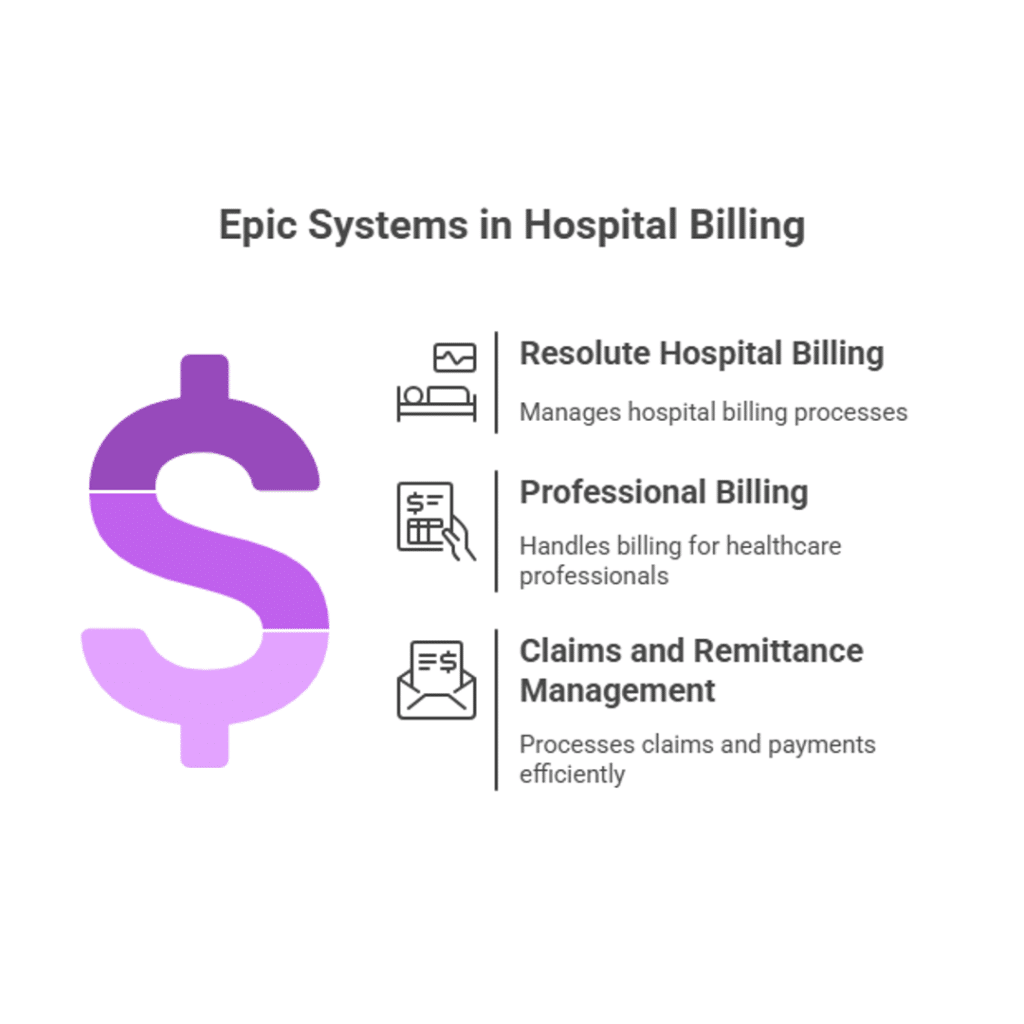
Maintaining Epic Certification and Staying Up-to-Date
After earning your certification, it’s important to maintain Epic certification and stay updated with the latest versions of the software. Epic regularly updates its tools, and being knowledgeable about new features keeps you competitive in the job market.
To stay current, you should:
- Attend regular training programs or webinars
- Join Epic user groups or forums
- Complete ongoing education modules on your Epic account
- Monitor Epic software release notes
Maintaining your certification shows employers that you’re committed to professional development and can help you earn epic certification while adapting to changes in healthcare IT.
Final Thoughts: Is Epic Certification Worth It?
Absolutely. If you’re aiming for a stable, well-paying career in healthcare IT, earning Epic certification is one of the best moves you can make. If you are preparing for the Epic certification exam, having the right study materials makes all the difference. Cert Empire offers high-quality exam dumps to help you get epic, practice exams, and reliable resources tailored to various Epic modules.
So, if you want to achieve Epic certification and take your healthcare IT career to the next level, check out Cert Empire today. They are the go-to platform for Epic exam dumps and much more.
Last Updated on by Team CE




















